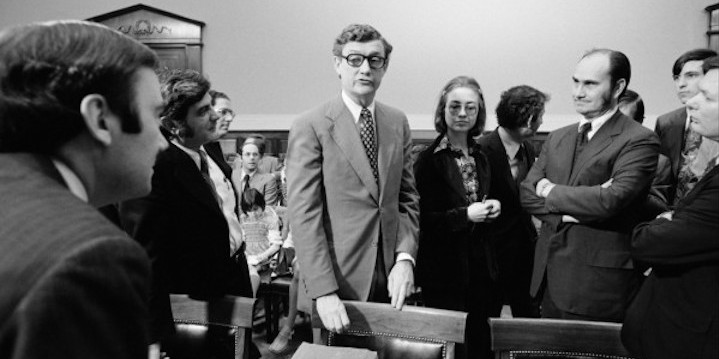High-profile politician Hillary Rodham Clinton has been dogged by rumors throughout her long career. One such rumor gained ground because it came directly from Jerome “Jerry” Ziefman, former counsel to the House Judiciary Committee, and it has been amplified in various forms ever since.
According to the rumors, as a 27-year-old working on the Watergate investigation in the 1970s, Hillary Rodham Clinton was “fired” from her position for being a “liar” and “unethical.” However, none of this was true; pay stubs dug up by the Washington Post in 2016 clearly show that Clinton was not fired, but that her work there ended, like everyone else’s, when Richard Nixon resigned:
Despite the historical record showing otherwise, the claims persisted. A piece written by Dan Calabrese (a conservative columnist, founder of the now-defunct Northstar Writers Group, and editor-in-chief of HermanCain.com) appeared in countless forwarded emails and was given a boost by talk radio host Rush Limbaugh, and so this especially persistent rumor was born:
At first, he was impressed, but in time Zeifman soured on her. He began, as he wrote in a 1996 book, to suspect her of collaborating with Democratic Senate aides loyal to Ted Kennedy. Their supposed aim was to keep the lid on the Watergate investigation out of fear Nixon would expose the “crimes of Camelot,” a phrase that appears in the book’s title. There are other subplots in his farfetched conspiracy theory, and other conspirators, including Judiciary Committee Chairman Peter Rodino — but little evidence for any of it.
The book reads like a Hollywood intrigue, which apparently occurred to Zeifman’s publisher, who promised on the book jacket to reveal “truths even more startling than those brought out in Oliver Stone’s movies Nixon and JFK.” Those films, remember, were works of fiction.
This titillating tale was reprised in 2008 when Clinton ran for president, thanks to conservative columnist Dan Calabrese, who embellished it a tad, introducing Jerry Zeifman as “the guy who fired Hillary Clinton.” A catchy line, but untrue: Zeifman lacked the authority to terminate her, and it’s a matter of historic record that she wasn’t fired.
As mentioned, the column was inspired by statements made by Jerry Zeifman, who served as counsel and chief of staff for the House Judiciary Committee during the Watergate investigation, and who wrote a book about the experience (the title of which was Hillary’s Pursuit of Power, which is an indication that it had little to do with chronicling Watergate itself.) It is also true that Ziefman accused her of being a “liar” and “unethical” during the House Judiciary Committee’s impeachment inquiry into Watergate, but claims that she was fired for those reasons are demonstrably false.
Jerry Zeifman said he supervised Hillary Rodham Clinton as she worked on the team that worked on the Watergate impeachment inquiry, and that during the investigation Hillary Clinton had “…engaged in a variety of self-serving, unethical practices in violation of House rules.”
According to Zeifman, Clinton (and others) wanted Richard Nixon to remain in office, so that Democratic senator Ted Kennedy would have a better chance of being elected president. He added that Clinton regularly consulted with Ted Kennedy’s chief political strategist (a violation of House rules) and that in addition to trying to help Kennedy win the presidency, Democrats also didn’t want Nixon to face an impeachment trial because they feared he might bring up abuses of office by President John Kennedy as part of his defense.
In a 1999 interview, Zeifman said he did not have the power to fire Clinton, or else he would have:
Zeifman does not have flattering memories of Rodham’s work on the committee. ‘If I had the power to fire her, I would have fired her,’ he said.
Zeifman said Rodham sparked a bitter battle among Democrats by recommending the Judiciary Committee deny Nixon’s lawyers the right to attend the closed-door meetings.
‘Can you imagine that? This was a committee of lawyers and members of the bar, and she was saying the committee should deny the president representation,’ he said.After a lengthy behind-the-scenes debate, Zeifman said the committee decided Nixon’s lawyers could attend.
In an interview on the Neal Boortz Show in 2008, Jerry Zeifman altered his claim about Hillary’s termination from the Watergate investigation, saying that he had terminated her and casting further doubt on his stories:
Well, let me put it this way: I terminated her, along with some other staff members who were — were no longer needed, and advised her that I would not — could not — recommend her for any further positions.
He contradicted himself yet again in a 2008 column, saying that he had fired her:
My own reaction was of regret, when I terminated her employment on the Nixon impeachment staff, I had not reported her unethical practices to the appropriate bar associations.
Hillary Clinton’s presidential campaign responded directly to Zeifman’s claims that same year with a flat denial:
In a column circulating on the Internet Jerry Zeifman alleges that Hillary was fired from her job on the House Judiciary Committee in the 1970s. This is false. Hillary was not fired.
Jerome Zeifman died in 2010, but the rumor lives on.
- Smith, Anne. "Limbaugh repeats assertion by Watergate committee counsel Zeifman that he "fired" Clinton -- an assertion reportedly contradicted by Zeifman himself."
- Hull Funeral Home. "Obituary for Jerome M. Zeifman."
- Kessler, Glenn. "The zombie claim that Hillary Clinton was fired during the Watergate inquiry."
- Cannon, Carl M. "The Smear Factor: Why We Hate Politics."
- Zeifman, Jerry. "Hillary’s Crocodile Tears in Connecticut."

